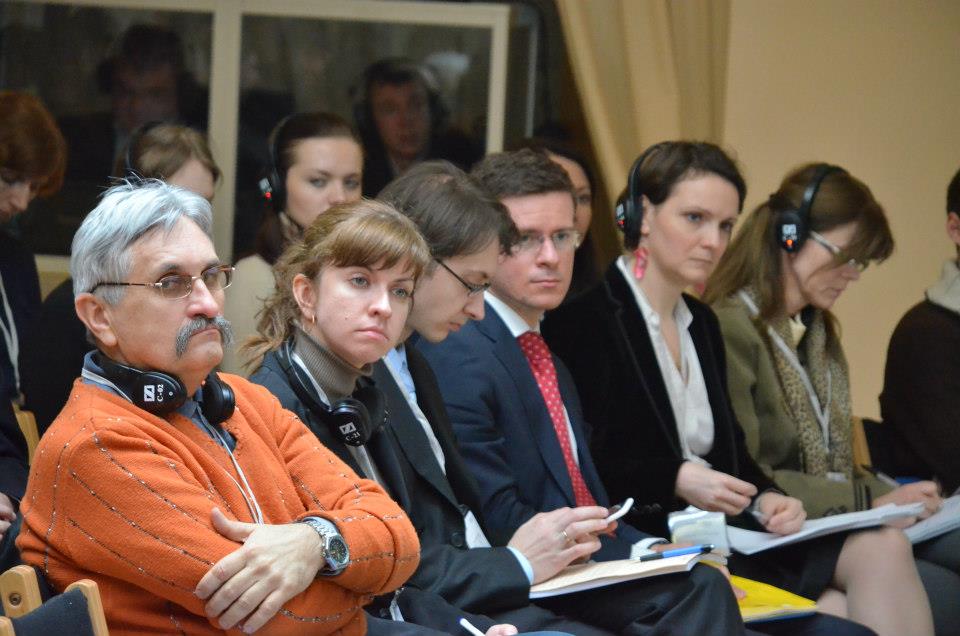Civil Network OPORA and the European Partnership for Democracy (Brussels) had the pleasure to invite, on the 20th of March in Kyiv, independent experts, diplomats and authorities to a discussion on EU-Ukraine relations.
The main aim of the conference titled "EU-Ukraine: a chance for a common future" was to analyze the prospects for signing the Association Agreement at the Eastern Partnership Summit in Vilnius later this year, taking into consideration the only vague progresses made by Ukraine in implementing the key conditions articulated by the European Union. The urgent need to reform election legislation and the need to ensure proper human rights observation were discussed as key priorities in this context.
At the beginning of the conference Juan Manuel Vilaplana López, Political Advisor of the Delegation of the European Union to Ukraine drew attention to the fact that the Association Agreement proposed to Ukraine and that has been initialed one year ago “is the most advanced such agreement ever negotiated by the EU”. At the same time, Oleksandr Sushko, Facilitator of the Ukrainian National Platform of the Eastern Partnership Civil Society Forum was not much optimistic about the prospects for signing the Agreement this year. As commented by the expert, there is a lack of political will in the country to implement all the conditions needed for such a signature.
During the thematic panels the conference participants had a chance to discuss what steps should be taken by the Ukrainian side in order to meet the EU requirements in two spheres (as stated in the Conclusions on Ukraine prepared by the Council of the European Union): overcoming problems with regard to Parliamentary elections on the 28th of October, 2012 and preventing human rights violation.
According to the director of the Election Law Institute and one of the Electoral Code drafters, Yuriy Kliuchkovskyi, “there is still a chance to adopt the Code once a proper law-making work is provided at the level of the parliament”. One of the tasks foreseen for the Code should be to introduce certain standards for the members of the election commissions. With regard to implementing OSCE/ODIHR recommendations, which has been strongly emphasized in a recent EU-Ukraine Summit joint statement, the situation is extremely complicated according to Denys Kovryzhenko, IFES expert. Indeed, most of the recommendations can actually not be fulfilled before November, 2013.
Although some positive tendencies have been observed – for example, according to Mykhailo Tarakhkalo from the Ukrainian Helsinki human right Union, the number of people informing about tortures has decreased - problems in the human rights sphere are still being noticed.
NGOs play an important role in the area of human rights defense. As an example, Volodymyr Chemerys - human rights activist and co-founder of the national initiative “For Peaceful Protest” – quoted trainings conducted by civic experts in order to guarantee the effective use and implementation of the law on peaceful assembly. As mentioned by the same expert, the number of public actions and protests increased by 1,5 times last year, although most of them were politically motivated. During the first months of 2013, the number of social and economic actions went up, i.e. protests of “Aerosvit” and “Ukrzaliznytsia” workers, miners etc.
Finally, the introduction of a National Preventive Mechanism against Torture was discussed as another important factor while ensuring respect for human rights. Yuriy Bielousov, the Representative of the Ombudsman, therefore encouraged the audience to participate in joint preventive activities – revisions, check-ups etc.

Additional information:
More information about the conference and photos can be found at the Project’s web-page as well as at EPD and OPORA web-sites. The event was organized within the EU funded Project “Enhanced civic engagement with reforms in Ukraine in the framework of European Neighbourhood Policy”. Contact person for the project – Iryna Shvets, Civil Network OPORA (063 628 68 40).
 Final Report of Association Agenda monitoring (Dec, 2011 - Sep, 2012).pdf
Final Report of Association Agenda monitoring (Dec, 2011 - Sep, 2012).pdf